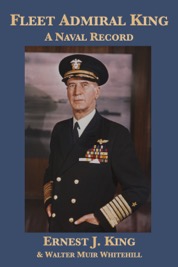 $9.99 on Kindle, Nook, Apple Books, Kobo, Google Play
$9.99 on Kindle, Nook, Apple Books, Kobo, Google PlayFleet Admiral King: A Naval Record by Ernest J. King and Walter Muir Whitehill (with a new introduction by David Kohnen; 250,000 words and 56 illustrations)
“For forty years Ernest King prepared himself for the supreme test. From 1901 to 1941 he moved through the grades from ensign to admiral; he saw service in battleships, destroyers, submarines, supply ships, and aircraft carriers, in Europe, Asia, and the Caribbean; he served in engineering, on the staff of the commander of the Atlantic fleet in World War I, on the General Board, in the Bureau of Navigation and as chief of the Bureau of Aeronautics; he taught at the Naval Academy and studied at the Naval War College where he worked on problems of Pacific strategy; and he commanded important units of the fleet. When the Japanese struck at Pearl Harbor, King was supervising convoy operations to Europe as commander of the Atlantic fleet. Within two weeks he was made Cominch, United States fleet, and three months later replaced Admiral Stark as chief of Naval Operations. No man in the United States navy was better equipped by training and experience to direct the global responsibilities of the navy in World War II; no man could have performed the job with greater success... The volume is a notable contribution to the history of the war... The amount of information on every aspect of the war — plans, operations, and logistics — is overwhelming. The European and Pacific phases are neatly interwoven. There are penetrating observations on leading personalities (of both world wars).” — Armin Rappaport, The Mississippi Valley Historical Review
“[A]n extremely important book... Fleet Admiral King is an important book because it enables us to appreciate the greatness of King. We get some idea of his logical mind, exceptional intellect, integrity, capacity for work, and wide range of professional knowledge. Without doubt this devoted public servant was the right man in the right place when the nation faced the greatest crisis in its history.” — Arthur J. Marder, Pacific Historical Review
“The memoirs of Fleet Adm. Ernest J. King... have been eagerly awaited for many years. The Admiral was counted on to furnish a bluntly outspoken record of his stewardship, and in this respect his book comes up to expectations... they reward careful reading as the record of one of the most effective and successful war leaders in the history of our country. This book will undoubtedly take its place among the classic military documents in the war annals of the United States.” — Donald Armstrong, Ordnance
“Admiral King’s memoirs have been worth waiting for. As it stands, this book is one of the most useful contributions to American naval history.” — Robert Greenhalgh Albion, The American Historical Review
“[An] important book... the best and most comprehensive discussion of the inner workings of the Joint and Combined Chiefs of Staff that has appeared... Fleet Admiral King is really two books in one: a skilfully drawn biographical study of the individual and, as a frank personal report of the highest United States naval commander in the war, a significant contribution to the history of World War II.” — Bern Anderson, The New England Quarterly
“[A] valuable book.” — J. A. Isely, The Annals of the American Academy of Political and Social Science
“[T]his record of Fleet Admiral King’s naval career is essentially autobiographical. The latter half of the... narrative deals with the Second World War and is naturally of the greatest interest. It authoritatively presents the Navy’s position on a number of strategic controversies, and adds to our factual knowledge of certain key events, such as the Casablanca, Yalta, Quebec and Potsdam conferences.” — Henry L. Roberts, Foreign Affairs
“The outstanding naval biography of the year, as well as the outstanding book, is Fleet Admiral King... For this portrays the career of not only a high-ranking American naval officer but is the biography of the man who was the acting head, not only as Chief of Naval Operations during World War II but Commander-in-Chief of the United States fleet, of the greatest aggregation of sea Power in the world’s history. Admiral King was a man who knew intimately practically all the great naval and military leaders of the times. His comment on the men and events of this crucial period should prove of fascinating interest.” — Louis H. Bolander, US Naval Institute Proceedings



